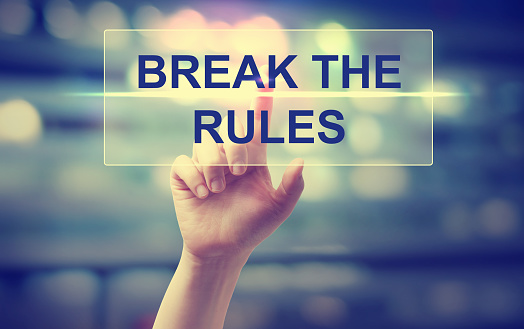6 Diet “Rules” You Should Break Right Now
Article posted in: Diet & Nutrition
Everyone has a theory about the best approach to weight loss. Don’t eat after 7 p.m. Eat only grapefruit. Skip anything with sugar. But the truth is that most of these “rules” won’t lead to lasting success. Worse, many will leave you short on energy and nourishment―a recipe for diet disaster. Put simply, losing weight is a matter of expending more calories than you consume. And to achieve long-term success, you’ll have to make lifestyle adaptations that are both realistic and sustainable. Subsisting solely on cabbage soup for the remainder of your life or never snacking again is neither of these things.
Here are six diet “rules” you should ignore on your way to health and happiness.
1. Just Don’t Eat
While it’s true that cutting unnecessary calories from your diet can be a safe and effective way to lose weight, it’s important not to cut too many. Calories are your body’s source of energy. Without them (or with too few of them), you will suffer serious health consequences. In a 2007 study published in The Journal of the American Medical Association, extreme calorie restriction (CR) was associated with malnutrition, a risk factor for a slew of issues, including anemia, muscle wasting, dizziness, fatigue, nausea, diarrhea, constipation, gallstones, irritability and even depression. Findings from other studies have linked extreme CR with risk factors for osteoporosis, plus reduced muscle mass, decreased capacity to engage in physical activity, increased cold sensitivity, menstrual irregularities and infertility. Many dieters also report experiencing insomnia and compensatory eating with excessive CR.
According to the Centers for Disease Control and Prevention (CDC), “healthy weight loss” is defined as a loss of about one to two pounds a week. To achieve this caloric deficit, you’d need to consume 500 to 1,000 fewer calories a day. Just be careful not to dip too low. Harvard Health Publications suggests that women and men trying to lose weight should consume a minimum of 1,200 and 1,500 calories a day, respectively.
To avoid health complications, start small. Research suggests that people who lose weight gradually and steadily are more successful at keeping it off―probably because they’ve taken the time to make healthy habits a regular part of their lifestyle. Try shaving off a few calories a day by reducing your portions or swapping out calorie-dense items with similar lower-calorie alternatives. Bake or grill foods instead of frying them, and be mindful of the add-ons (like salad dressing, butter, condiments, sugar and cream) you add to otherwise low-calorie foods.
2. Cut All Carbs
Protein, fats and carbohydrates are macronutrients: literally “large nutrients,” or those nutrients the body needs in large quantities to support growth, metabolism and countless other important functions. Of the macronutrients, our bodies need carbohydrates in the largest amount, because they’re the body’s main source of fuel, and every tissue and cell uses them for energy. Carbs also play a role in functions of the central nervous system, kidneys, brain and muscles, including the heart; and play a key role in intestinal health and waste elimination. Given their importance in the body, cutting carbs altogether is asking for trouble.
Instead of writing them off completely, try being more selective. Avoid foods that contain large amounts of refined sugars and don’t provide many nutritional benefits, like white bread, sugary beverages and cereals, and sweets. Instead, opt for foods containing complex carbs (the “good” kind) like brown rice, quinoa, beans, whole grain breads (shown above), oats and vegetables.
3. Don’t Eat Fats!
In the weight loss world, fat has gotten a bad rap. But the reality is some fat is necessary for life. In humans, fat helps support normal growth and development, provides energy, allows proper cellular function, provides protective cushioning for organs and helps with absorption of certain vitamins like A, D, E and K. Since saturated fats—found in foods like meat, butter, lard and cream—and trans fats—found in baked goods, fried foods and margarine—are associated with increased risk of cardiovascular disease, try replacing them with unsaturated fats, which are associated with a decreased risk of this chronic disease. Sources of this type of fat include plant-based oils like olive and canola, avocados, nuts and seeds.
4. Hit the Gym for Hours and Hours
Engaging in regular physical activity is an important piece of the weight loss puzzle and should be a regular part of your regimen. But moderation is key. Too much exercise can lead to a number of issues like hormonal imbalance, fatigue, insomnia and depression. Many people also experience a drastic increase in appetite after extreme bouts of physical activity, which can lead to overeating and negate any weight-related benefits of exercising.
In a paper published in The American Journal of Physiology, overweight, sedentary men who performed 30 minutes of daily aerobic exercise for 13 weeks experienced similar weight loss and body fat losses to those who performed 60 minutes per day, suggesting that the weight-related benefits of exercise are achieved with moderate amounts of exercise. According to the CDC, adults should perform at least 150 minutes a week (about 30 minutes five days a week) of moderate-intensity, or 75 minutes a week of vigorous-intensity aerobic physical activity, or an equivalent combination to achieve optimal health benefits.
5. Say Goodbye to Your Social Life
While it’s true that parties and happy hours aren’t exactly diet-friendly, with a little planning, you can still enjoy life while you lose weight. If you’re headed to a party, offer to bring a veggie tray and a healthy dish you love. That way, if the rest of the spread looks like weight gain waiting to happen, you’ll have options. The easiest way to make happy hour a healthy hour is to avoid alcohol altogether. But if you do choose to imbibe, opt for a small glass of a lower-calorie option like red wine or light beer. Make sure to sip slowly, and don’t skimp on water. Since happy hour takes place dangerously close to dinner time, plan to have a healthy afternoon snack that will hold you over before you head out, and set a happy hour curfew. That way you’ll avoid the temptation to dig in to calorie-packed bar food, and can head home for a healthy dinner.
6. Ban “Bad Food”
We all know what happens when we make a hard and fast rule about foods we’re not “allowed” to have: We end up craving them more and we lose the battle of wills, overindulge, deem the day a lost cause and plunge headfirst into the pantry for some more diet damage. Sound familiar?
But there’s good news: you can still enjoy your favorite foods as part of a healthy eating plan. In fact, allowing yourself the occasional indulgence just might be the key to sustaining a healthy lifestyle over the long-term. Losing weight boils down to one simple equation: Eat fewer calories than you burn. If you indulge at one meal, just go a little lighter at the next. Watch the total number of calories you consume, and make sure you don’t make a habit of displacing healthy foods full of nutrients your body needs. The bottom line is that losing weight and living healthy is all about moderation. Don’t allow your splurge to become a full-blown downward spiral and you will still achieve your goal.














